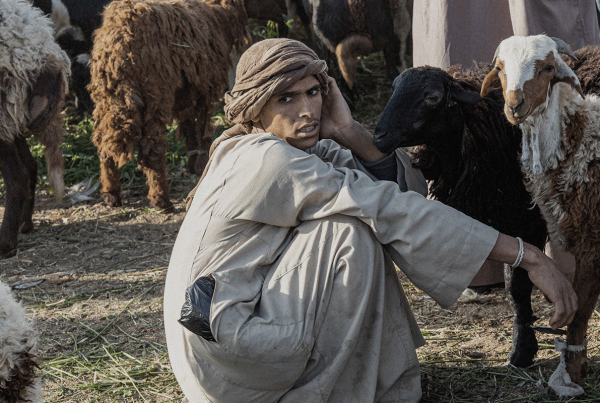The Badi people are of the lowest caste in Nepal. For centuries they have been exploited and discriminated against. They are ideal targets of human trafficking in Nepal: vulnerable, impoverished, desperate, and, according to many, the “worthless dust of Nepal” or “the untouchables of the untouchables.”
Sold, kidnapped, and coerced, many Badi people have been forced to work as sex slaves in India and Nepal. Until this generation, the expectation is that Badi women’s sole purpose was to satisfy the sexual cravings of men. But now a new story is being told.
Human Trafficking in Nepal: Meena’s Story
The rickshaw motor hums as we careen through the dark night. Hands gripping the wheel, the driver seems single-minded in his determination to deliver his cargo on time. A bundle of Indian rupees awaits him if he does.
The streets around us are filled with the sounds of beer bottles clanging, food sizzling, and Bollywood music blaring. Men are everywhere: walking, eating — and looking.
There is a lot to look at around here. Some girls hang out of windows from above, inviting the men on the street below to come closer. Others stand in doorways, their lips painted bright red, swaying their hips seductively. I see a man in one of the brothel doorways — I know him to be a pimp. He urges passing men to stop.
“You want a girl? You are in the right place! We have many young and beautiful girls for you here … I give you a good price!”
This is Garstin Bastion Road — known as G.B. Road — in the city of New Delhi. It is one of India’s most well-known red-light districts.
I shudder at how well I know this place. At nine years old, I was abducted from my village in Nepal and trafficked to India as a sex slave and house servant to three brothers.
India has been a dangerous place for me ever since. But right now, it is particularly perilous. I wonder, Do my captors know about my plan to escape? If so, I’m sure they’re already scouring the streets, desperate to capture me, their “property.” If they do, the brothel bosses will be very angry and I will be badly beaten — or worse.
We’re getting close to the meeting point where Rajesh and my aama (mom) await. If all goes well, I will soon see my four children in Kathmandu. One by one, each was rescued and has been protected from becoming one of the thousands of women and children enslaved in G.B. Road’s brothels.
My rickshaw rounds a corner, and I see him, waiting right where he promised. Rajesh’s eyes light up. He makes his way to the rickshaw, pays the driver, and directs me into a waiting taxi, where I find my aama. As I collapse into the seat, my mother wraps her arms tightly around me and whispers tearful prayers of gratitude that I made it safely. Closing my eyes, I rest my head on her shoulder as the car speeds toward the border of India and Nepal.
After thirteen long years as a sex slave in the brothels of New Delhi, during which I estimate I “serviced” 20,000 men, this is the day of my rescue and return home to Nepal.
— Excerpt adapted with permission from No Longer Untouchable: Stories of Heroism, Hope, & Human Trafficking by Sarah Davison-Tracy with a foreword by Devisara Hannah Badi.
Sarah Davison-Tracy
Devisara Hannah Badi
“Just how things are”
If brothels, human trafficking, and sex slavery seem too distant to relate to, I understand. It’s a far cry from my daily reality, too.
But it is a very real and daily reality for many.
Take a moment to pause and consider: What would you do if girls in your neighborhood — in your community — started to disappear, one by one? What if that began happening so often that it became “normal” and “just how things are”?
This is exactly what has been happening in Meena’s community for decades. Badi girls and women have been trafficked, lied to, coerced, drugged, kidnapped, raped, and taken far from home. To understand how this could happen, it is important to understand the caste system and where the Badi people fall in this social hierarchy.
Caste and Human Trafficking in Nepal
Caste discrimination affects an estimated 260 million people worldwide, the majority of whom live in South Asia. It is considered by many to be one of the strongest racist phenomena in the world. Within the caste system, the Dalits or untouchables are believed to be inherently impure, such that it is unacceptable to be in close physical proximity with them. Touching anything they may have touched or walking on a path where they may have walked is believed to contaminate someone of a higher caste.
Among the Dalits, there are levels of hierarchy as well. Sometimes called “the dust of Nepal” or “the untouchables of the untouchables,” the lowest of all among the Dalits are the Badi. For hundreds of years, the Badi made their living as entertainers, performing songs and dances and telling stories at festivals, weddings, and private parties. Badi translates to “musical people,” and they were often sought-after musicians, singers, and dancers.
However, in the 20th century, several events occurred that impacted the livelihoods of the Badi. In 1951, the Rana oligarchy ended in Nepal. It shifted power structures and reduced opportunities for work among the Badi and other low-caste communities.
In the 1960s, the population increased in the far west of Nepal, where the Badi lived, and access to radio and television for entertainment expanded. As jobs became harder to come by and the Badi were less frequently employed for entertainment, poverty deepened. To compensate for their significant loss in employment, some Badi women began to turn to prostitution for their livelihood.
Today, the Badi have had little to no access to education, healthcare, land ownership, and citizenship. Most Badi are illiterate. Teachers and higher-caste children have frequently banned Badi and other low-caste Dalit children from their classrooms. One-third of Badi are homeless, and two-thirds are living on public or government land. Nearly 75% of Badi men migrate to search for employment, leaving women and children to fend for themselves.
These complex factors have created the devastating reality that prostitution and selling girls to traffickers have become sources of income for many Badi families. Even while a woman is pregnant, it is common for her to be approached by a trafficker, who offers her a deposit in exchange for the promise that if she gives birth to a girl, that girl will be sold to the trafficker. Generally, when the girl is around ten years old, the trafficker will return for the girl, pay the family, and take her to a brothel where she is enslaved as a sex worker — mostly likely for the rest of her life.
In 2018, 35,000 people, including 15,000 women and 5,000 girls, were victims of human trafficking in Nepal. Many girls are trafficked before they reach ten years of age, as virgins and young girls are more profitable. Once sold, a girl is forced to stay until her purchase price, often called her “debt,” is paid back. It is a nearly impossible task, and most never repay their debt or leave the brothel.
No Longer Untouchable : Stories of Human Trafficking, Heroism, and Hope
When human trafficking became personal
Most of the women who escape this system never tell of their abuse. But Meena and a handful of brave women affected by human trafficking in Nepal together found the courage to speak and raise their voices for the world to hear.
My life began to be woven together with these women when Meena’s younger sister, Devisara Hannah Badi, called “Hannah” by many, and I became friends. She connected me with some of her friends and family who had experiences similar to hers.
That is when the “cause” of human trafficking became personal.
The previously anonymous statistics of human trafficking took on the smiles, dreams, and humanity of each of my beloved friends. I call them bahiniharu, Nepali for “little sisters.”
As our friendships grew, I learned the heartbreaking details of their stories. They shared the abuse and trauma they endured since birth. I was in awe of their courage, vision, and unwavering hope. I became impassioned to tell their stories so that this horrific cycle of abuse could begin to change.
I believe that they are storytellers who will ignite our world with much-needed truth and hope.
Though human trafficking in Nepal is overwhelming, there is good news. Not only did Meena escape, but she returned to India to rescue many other women and children. Hannah, her little sister, is an emerging leader among the Badi and has a big dream to become Prime Minister of Nepal.
Because of their courage and a community of support, Meena, Hannah, and a growing number of Badi women are leading the way to rewrite the narrative of what it means to be Badi. They are redefining what is possible for women in their community, as they graduate from college, become human rights activists in and outside of Nepal, and create a safe and secure community for their own children.
They have told their stories in No Longer Untouchable: Stories of Heroism, Hope, & Human Trafficking, the first book ever to be published in English about the Badi. In this book, you can enter into, learn from, and be inspired by our heroic sisters’ stories. Their stories speak of unstoppable hope and healing after unimaginable trauma.
Read this book and be reminded that hope does triumph. Love does heal. Heroes do rise from the dust. Join us in this fight…so that everyone, everywhere, is free.
By Sarah Davison-Tracy
Whether traveling the globe or nestled in the backyard of her home in Colorado with her renaissance-man of a husband and two beloved children, Sarah Davison-Tracy is an impassioned human rights advocate, author, speaker, and founder of Seeds of Exchange. Connect with and see what Sarah is up to at sarahdavisontracy.org.
Sarah seeks to ignite fierce love, connection, and justice so the people of the world are fueled by an unstoppable commitment to the well-being of one another. She believes with all her heart that she is on the planet to love. To love God and to love her sisters and brothers. To be love and to be loved. Unabashedly and unequivocally.






